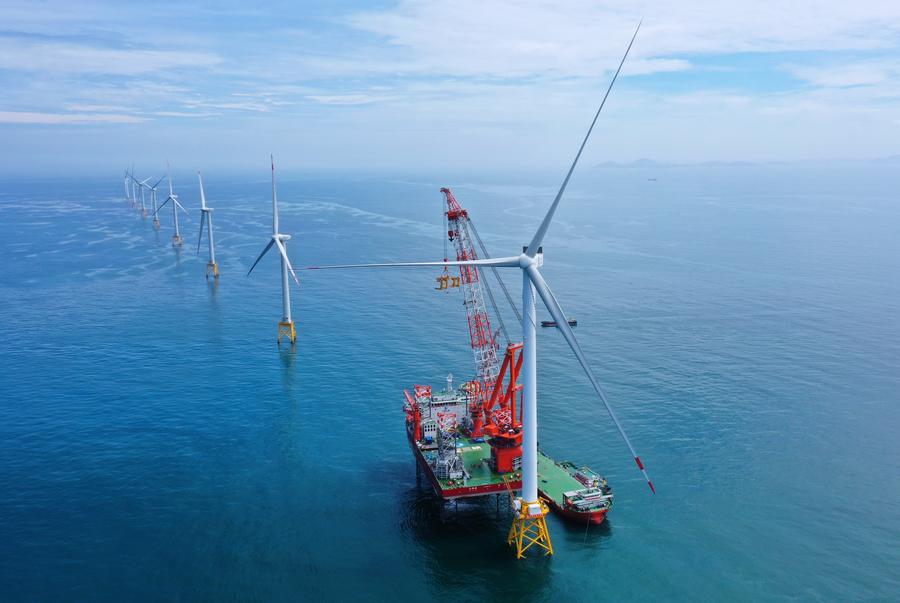China's economic growth has ripple effects on the global economy. As the world's largest exporter and second largest importer, China is central to global supply chains, technology transfer and trade networks.
By Teddy Kaberuka
The Chinese economy has seen significant growth for decades, with an average annual GDP growth rate of more than 9 percent. Millions of people have been lifted out of poverty. During this time, GDP has increased rapidly from US$149.55 billion in 1978 to US$14.34 trillion in 2019, and there have been significant improvements in access to health, education and other services.
This economic transformation has profound consequences not only for China but also for the global economy. Through rapid industrialization, urbanization and technological advances, China has emerged as a major player in the global economic landscape. China's strong manufacturing sector has served as the engine of its economic expansion.
With its vast labor force and low manufacturing costs, China has emerged as the world's factory, assembling an array of goods from consumer electronics to heavy machinery. This manufacturing process has spurred export-oriented growth and created large-scale employment opportunities. As China continues to expand its influence on the world stage, its economic activities have increasingly expanded beyond its borders, including the African continent.
China-Africa Trade and Investment
China's economic engagement with Africa has grown exponentially over the past few decades, making it Africa's largest trading partner. Bilateral trade between China and Africa increased, driven by China's demand for natural resources and exports of finished goods and Africa's need for infrastructure development and investment. This mutually beneficial relationship has boosted economic growth and development in many African countries and beyond, creating opportunities for job creation, industrialization and poverty reduction.
China has become Africa's largest trading partner, with two-way trade reaching US$282.1 billion in 2023, according to the latest Chinese customs data. The $21.7 billion investment by 2023 is part of China's broader economic strategy to secure access to resources, open new markets and develop diplomatic ties with African countries. Additionally, China has invested in extractive industries such as mining and oil production, often in exchange for access to natural resources.
Also, Chinese companies have established manufacturing facilities in Africa, creating jobs and transferring technology to local economies. Investments in telecommunication, finance and other service sectors are also significant.

Infrastructure development
Through the Belt and Road Initiative (BRI) launched by China in 2013, China is heavily involved in financing and building infrastructure projects across the African continent to improve transport networks, trade routes and economic integration.
China's BRI has become a cornerstone of its economic diplomacy, which aims to improve connectivity and promote economic cooperation across Asia, Africa and Europe. The BRI has led to significant investments in infrastructure projects in Africa such as roads, railways, ports and energy facilities. These investments improve connectivity between Africa and the rest of the region, facilitating trade, investment and economic integration. African countries benefit from improved infrastructure that promotes economic growth, facilitates trade and attracts foreign investment.
Capacity building
China's engagement with Africa also extends to development assistance and capacity building. Through initiatives such as the Forum on China-Africa Cooperation, China provides aid, grants and concessional loans to support infrastructure projects, health, education and agricultural development in Africa. In addition, China provides scholarships and training programs for African professionals, promoting human capital development and promoting long-term sustainable development.
From China's perspective, humanity shares a common role in development, and world stability and prosperity can only be achieved if developing countries advance. Therefore, China seeks a global community with a shared future. Through international cooperation, China has helped other developing countries to mitigate the impact of the epidemic, accelerate actions towards the UN 2030 Agenda and achieve common prosperity.
Global economic impact
China's economic growth has ripple effects on the global economy. As the world's largest exporter and second largest importer, China is central to global supply chains, technology transfer and trade networks. Its strong domestic demand drives demand for goods and services worldwide, supporting economic growth and job creation in exporting countries. With huge industries and high demand for raw materials, China is the world's top producer of goods and the largest buyer of commodities such as oil and metals. This means that what China wants affects prices and supplies everywhere, shaking up how trade works and how things are made.
For Africa, China's economic expansion presents opportunities. China's demand for commodities such as oil, minerals and agricultural products has provided African countries with lucrative export markets, contributing to economic growth and infrastructure development.
China's growing economic influence has led to the need for reforms in international financial institutions, such as international financial institutions, to better reflect the changing balance of economic power, coordination on global economic issues, and contribute to a more inclusive and equitable global economy. order This helps the development of other countries and gives China more power in global monetary matters, asserting its presence in international finance and trade.
The strong growth of the Chinese economy is transforming Africa and shaping the global economic landscape. Through trade, investment, infrastructure development and capacity building, China's engagement with Africa promotes economic growth, reduces poverty and promotes sustainable development. Furthermore, China's integration into the global economy promotes stability, prosperity and cooperation, strengthening its position as a key driver of global economic growth and development.
Editor's Note: Teddy Kaberuka is a Rwandan economic analyst and international consultant.
The views expressed in this article are those of the author and do not necessarily reflect those of Xinhua News Agency.■

„Oddany rozwiązywacz problemów. Przyjazny hipsterom praktykant bekonu. Miłośnik kawy. Nieuleczalny introwertyk. Student.
